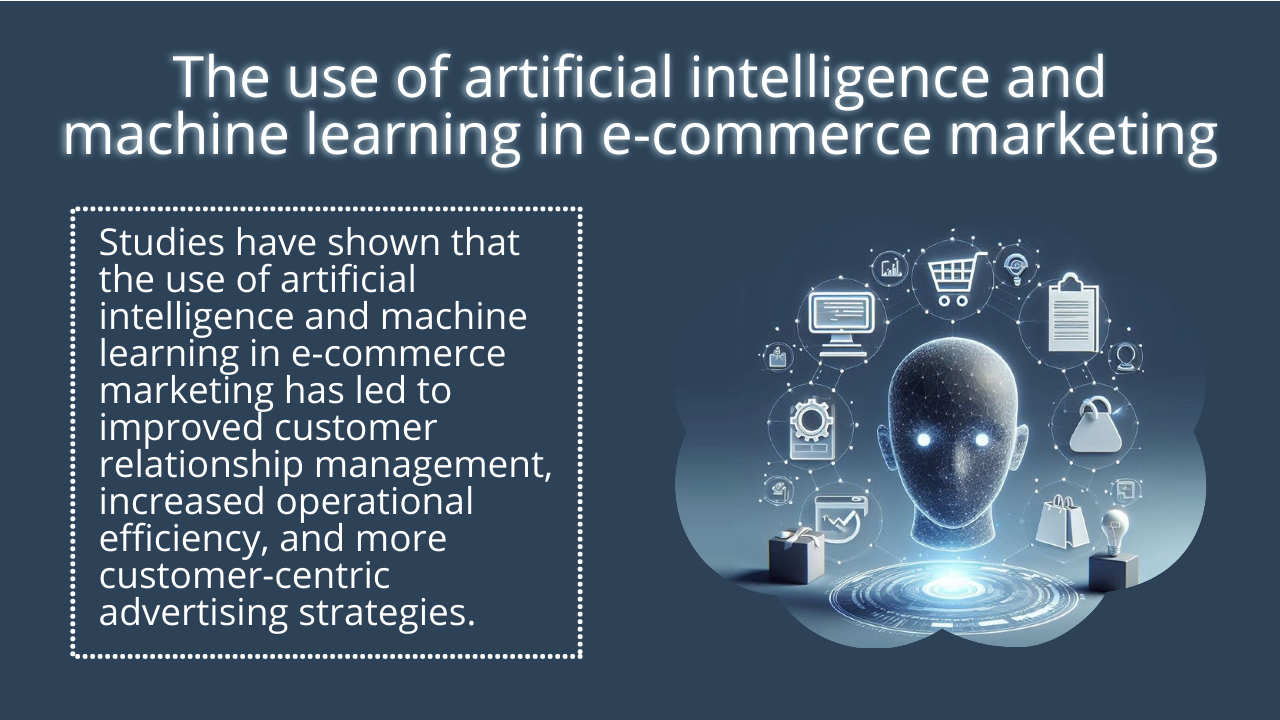The use of artificial intelligence and machine learning in e-commerce marketing
DOI:
https://doi.org/10.15587/2706-5448.2024.305280Keywords:
artificial intelligence, machine learning, e-commerce marketing, personalized customer experienceAbstract
The object of this research is the use of artificial intelligence (AI) and machine learning (ML) in e-commerce marketing strategies. Traditional e-commerce marketing approaches often lack a personalized customer experience and find it difficult to adapt to changing consumer behavior. The integration of artificial intelligence and machine learning offers a solution to these problems, enabling real-time marketing initiatives and data analysis.
Studies have shown that the use of artificial intelligence and machine learning in e-commerce marketing has led to improved customer relationship management, increased operational efficiency, and more customer-centric advertising strategies. In addition, technologies such as visual search, virtual personal shoppers, and real-time product targeting have changed the e-commerce landscape by providing interactive and personalized shopping experiences. Artificial intelligence and machine learning algorithms analyze vast amounts of customer data to identify patterns, preferences and trends, enabling e-commerce businesses to conduct targeted marketing campaigns and optimize product offerings. Using advanced technologies, companies can streamline operations, increase customer satisfaction and stay ahead of the competition in the digital marketplace. This data suggests that integrating artificial intelligence and machine learning into e-commerce marketing strategies can benefit businesses by improving customer engagement, increasing sales, and gaining a competitive advantage. However, a successful implementation requires access to quality data, a robust AI infrastructure, and ongoing monitoring and optimization to ensure effectiveness and relevance in a dynamic marketplace.
References
- Fedorko, R. et al. (2022). Artificial Intelligence and Machine Learning in the Context of E-commerce: A literature Review. Prešov: University of Presov.
- Kalia, P. (2021). Artificial Intelligence in E-Commerce. A Business Process Analysis. In Artificial Intelligence. CRC Press. doi: https://doi.org/10.1201/9781003095910-2
- Li, J. (2022). E-Commerce Fraud Detection Model by Computer Artificial Intelligence Data Mining. Computational Intelligence and Neuroscience, 2022, 1–9. doi: https://doi.org/10.1155/2022/8783783
- Singh, R. (2021). A Study of Artificial Intelligence and E-Commerce Ecosystem – A Customer’s Perspective. International journal of research in engineering, science and management, 4 (2), 78–87. Available at: https://journal.ijresm.com/index.php/ijresm/article/view/507
- Micu, A., Geru, M., Capatina, A., Constantin, A., Rusu, R., Panait, A. A. (2019). Leveraging e-Commerce Performance through Machine Learning Algorithms. Annals of Dunarea de Jos University of Galati. Fascicle I. Economics and Applied Informatics, 25 (2), 162–171. doi: https://doi.org/10.35219/eai1584040947
- Sangeetha, K. (2023). A Study on Artificial Intelligence in Ecommerce Industry. International Journal of Creative Research Thoughts, 11 (10), 135–167.
- Soni, D. V. (2020). Emerging roles of Artificial Intelligence in ecommerce. International Journal of Trend in Scientific Research and Development, 4 (5), 223–225.
- Khrais, L. T. (2020). Role of Artificial Intelligence in Shaping Consumer Demand in E-Commerce. Future Internet, 12 (12), 226. doi: https://doi.org/10.3390/fi12120226
- Kar, R., Haldar, R. (2016). Applying Chatbots to the Internet of Things: Opportunities and Architectural Elements. International Journal of Advanced Computer Science and Applications, 7 (11), 147–154. doi: https://doi.org/10.14569/ijacsa.2016.071119
- Dhavare, U., Kulkarni, U. (2015). Natural Language Processing using Artifical Intelligence. International Journal of Emerging Trends and Technology in Computer Science, 4 (2).
- Gupta, S., Borkar, D., De Mello, C., Patil, S. (2015). An ECommerce website based Chatbot. International Journal of Computer Science and Information Technology, 6 (2), 1483–1485.
- Pannu, A. (2015). Artificial Intelligence and its Application in Different Areas. Internal Journal of Engineering and Innovation Technology, 4 (10).

Downloads
Published
How to Cite
Issue
Section
License
Copyright (c) 2024 Anton Zhuk, Oleh Yatskyi

This work is licensed under a Creative Commons Attribution 4.0 International License.
The consolidation and conditions for the transfer of copyright (identification of authorship) is carried out in the License Agreement. In particular, the authors reserve the right to the authorship of their manuscript and transfer the first publication of this work to the journal under the terms of the Creative Commons CC BY license. At the same time, they have the right to conclude on their own additional agreements concerning the non-exclusive distribution of the work in the form in which it was published by this journal, but provided that the link to the first publication of the article in this journal is preserved.







